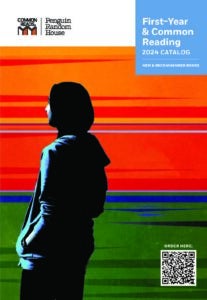Use digital and social media to your advantage. Use your university’s existing social media webpage or accounts (Facebook, Twitter, etc.), or create a dedicated page for your common reading program to build a community around your book selection, author visit, and other programming activities. Many authors, publishers, and lecture agencies have existing material that can be posted to your community page.
Prepare students. Consider introducing the book during the spring or summer prior to the beginning of the academic year. For example, if first-year students receive the book during Orientation, the Orientation Leaders and various speakers can advertise the program and build a feeling of community around the reading of the text.
Have students create materials in advance of the author’s visit. Assigning students to write an essay about the common read is a great idea. Some programs have turned this into a prize competition. You may also consider multimedia approaches—such as blogs, videos, or a website. Students tend to share more on a personal level when they are not in an open forum and the medium can be anonymous.
Another idea is to have students autograph and annotate the author’s book. In addition to brief messages to the author, annotations can call attention to the passages of the book students find most compelling or personally resonant. Authors appreciate different perspectives on and reactions to their work, and they can take home the annotated book as a memento to commemorate the event!
Also, think about having students turn in questions for the author as part of an assignment, and have a moderator pose the questions to the author. This will incentivize students to come up with more original questions, will save on time during the Q&A, and will avoid dreaded “dead air.” Turn this activity into a contest to help encourage student participation.
Organize campus-wide discussion groups. Utilize faculty, student volunteers, or some combination of faculty, staff, and students to facilitate these discussions. Again, this is a good way for first-year students to feel that they are a part of the university community.
Link the book to as much existing campus programming as possible. Can the Film Studies department co-sponsor a viewing of a film related to your book? Are there plays, arts exhibits, or other speakers coming to campus that you could tie into? Perhaps Student Activities can help organize events as well? Reach out to faculty who teach courses relevant to your book selection, provide them with review copies of the book, invite them to planning meetings, and ask them to embed the book in their syllabi and courses. If your book selection committee includes faculty members, they will be a great resource in making these connections.

